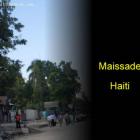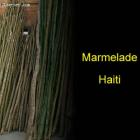ADVERTISEMENT
Voodoo - Haiti Observer Blog
Voodoo, Haiti Observer Blog. Read the following articles about Voodoo
Ghede, Doesn't the "Pimen" burn after the Lwa is Gone?
Like 99% of Haitians, I believe in the Haitian Voodoo. I have observed people being possessed by Lwas. On this November 2, this is high time for Ghede tradition where the "Randed-Vous" is at various Cemeteries around the country.
Baron Samedi will be everywhere, dancing, drinking and performing a variety of acts that would only be allowed on this day of Ghede.
One thing that I am always puzzled about during Ghede is the phenomenon of washing oneself with Hot Pepper, In Haitian Creole, "Pimen". Usually, the people who are possessed by "Papa Ghede" or "Baron Samedi" make sure that the Hot pepper is inserted in their sexual organ.
Ghede, Haitian Lwa That Embody Powers of Death & Fertility
The Ghede (often spelled as Gede or Guédé) Lwa families in Haiti practice powers of life, death and fertility through Haitian Vodou. They serve as the intermediaries between the creator god or the good god (Bon Dieu or Bondye) and humanity.
Ghede means 'the sacred dead'. "Lwa" often referred as 'Mystères and the Invisibles'-- are the spirits of Haitian Vodou. Fete Ghede or Gede Festival is a past-honoring event also known as the 'Festival of the Ancestors' performed on Second November every year in the honor of the 'Lord of the Dead'. It is the day to repay the boons granted by Ghede otherwise they will take revenge on you. During the ceremonies of Fete Ghede, there is always a spiritual procession to the cemetery. The women spiritual adepts are called 'mambos' and their male counterparts are known as 'houngans'. They join drummers and singers at the festivals and pray at a cross rising from a tomb; summon the spirits before the party begins.
Haitian Mother would not let children Trick-or-treat on Halloween
We have a dilemma in this house, hoping you will help to bring some light. I have a friend of mine, a "typical Haitian" who is extremely religious. The problem is that she has two young children that she would not let them go out on Halloween to do Trick-or-treating in the neighborhood.
Reasons of mother not wanting her children to "Trick or treat":
"This is not good for children, they are worshiping the devel",
" Sa Se Bagay Djab"
"Sa Se Voodoo"
Obeah is to Jamaican what Voodoo is to Haitian
After the government of Jamaica abolished colonial-era punishments, the Obeah believers are optimistic that decriminalization of the Obeah practice will follow. The practice, which is similar in so many ways with the Haitian Voodoo was banned hundreds of years ago by the Jamaican government. Those who attempted the practice have been flogged or thrown to prison among other forms of punishment.
The idea to decriminalize a practice considered as black magic by many is already receiving criticism from many Christians in Jamaica. Jamaica is claimed to have the highest ratio of churches to citizens in the globe. In Jamaica Christianity is the dominant religion with people gathering in wide range of structures-wooden holding a small number of congregants to mega structures holding thousands of believers.
The 222nd anniversary of the Ceremony Bois Caiman
The Haitian community is preparing for the 222nd anniversary of the Bois Caiman Ceremony. The ceremony is celebrated to mark a remarkable event which gave birth to the first ever black republic in the world. Bois Caiman Ceremony first celebrated on the 14th day of August 1791 remains a symbolic event in the history of humanity.
In reminder to the Haitian people Lesly Condé expressed his expectation for good participation from the Haitian Community during this important event. Lesly is the Consul General of the Republic of Haiti in Chicago.
The Serpent and the Rainbow - Movie about Haitian Zombie
The Serpent and the Rainbow is a horror movie that was directed by Wes Craven in year 1988. The movie was inspired by a book by Wade Davis, which had the same title. Davis was an ethnobotanist from Harvard who investigated Haiti's Voodoo society and found out two drugs that were used for the purpose of zombification. The drugs he identified were used by the Voodoo practitioners to dramatically reduce the metabolic rate of victims which made them appear as if they were dead. The victims were then buried and later they were dug up and revived using herbal brew. The resurrected victims appeared lobotomized.
Jean Price-Mars a Haitian of Stellar Intellect
Jean Price-Mars, leading mind of the Black intelligentsia, assumed prominent roles in the Haitian government as a young person barely out of his teens. The government delegated him Ambassador of Haiti to France, Germany, the Dominican Republic, and U.S. His scientific aptitude led him to study anthropology and medicine, his gift for analysis made him an academician.
Price-Mars worked as teacher, politician, and writer. During his political career, he served as Secretary of State, ran for the presidency, and represented his country as two-term senator. As thinker and writer, he advocated negritude, a pride in being black and the empowerment that meant.
Lack of LGBT Rights in Haiti a Serious Concern to the Diaspora
The government of Haiti (GOH) and Haitian culture does not support the lesbian-gay-bisexual-transsexual (LGBT) movement. In fact they openly oppose LGBT rights, having expressed their disapproval as far back as 1986.
The Roman Catholic Church and its affiliated groups have also condemned existence and practice of same-sex relationships. But one faith does show acceptance of LGBT people, Voodoo believers. LGBT persons are welcomed to participate in ritualistic rites, and are allowed to ascend the hierarchy as long as they prove themselves worthy.
The Diaspora, in New York City, in 2007 founded social service agency, Haitian Lesbian and Gay Alliance, (HLGA) to support the LGBT community and raise awareness in Haiti. Encouraged by the HLGA's public endorsement, a sprinkling of Haitian gays participated in a gay civil-rights march in 2008, the first of its kind in Haiti.
Diversity in Haitian Culture and Attitudes toward U.S. Health System
Religious Origins.
Haiti culture is informed by multi-cultural influences. Religious traditions are grounded in Voodoo and Roman Catholicism. The melding of these two different belief systems arose when Voodoo was imported by African Congolese slaves. It soon became cross-bred with French and Spanish settlers' Christian practices.
Music Origins
Haiti's musical traditions have derived from Voodoo, Afro-Cuban, and Creole jazz-roots genres.
Food Origins
Fabre Geffrard allowed African-Americans to settle in Haiti
Guillaume Fabre Nocolas Geffrard or simply Fabre Geffrard was the 10th President of Haiti who sworn in as the head of the Republic in 1859 and stayed in power till 1867. Few of his important achievements include placating peasants through revival of state-owned land selling practice and he also ended the differences with Roman Catholic Church. As the schism was erased, the Roman Catholic Church eventually played a very crucial role in improving the education system in Haiti.
The first thing Fabre Geffrard did after coming to power was that he reduced the army size from 30,000 to its half at 15,000 and at the same time created presidential guards who were trained by Fabre Geffrard himself. In 1859, the National Law School was founded by him and the Medical School started by Boyer was reinstituted. Several lycea were established and modernized by his two ministers François Elie-Dubois and Jean Simon Elie-Dubois. In 1863, the colonial rule of building and maintaining roads were reintroduced. In 1861 African-Americans were allowed to settle in Haiti.
Our objective is to share with you news and information about Haiti and the people of Haiti. Traditions, habits and the way we were or grew are alive in this site. We highly recommend that you Subscribe to our Newsletter and also share with us some of the things that are memorable and made us unique people.

 Informative Marketing and Advertising in the Haitian Community
Informative Marketing and Advertising in the Haitian Community  Newsletter
Newsletter  Maissade, Haiti
Maissade, Haiti  Something to think about
Something to think about  Marmelade, Haiti
Marmelade, Haiti